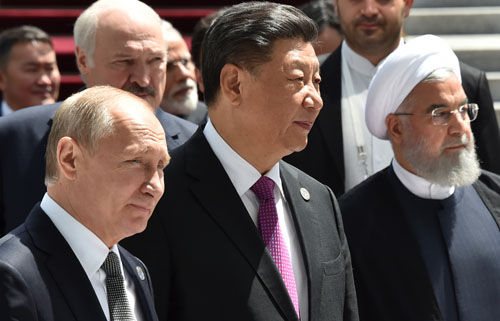by WorldTribune Staff, June 20, 2019
Russia is not the only foreign actor intent on spreading disinformation to cause disruption among its foes. China and Iran are also employing operatives in “information manipulation,” the intelligentsia’s term for fake news, reports say.
China insists that it does not interfere in other nations’ internal affairs, but the Pentagon has concluded otherwise.

In a report released earlier this month, the Pentagon said that the communist country “conducts influence operations against cultural institutions, media organizations and the business, academic, and policy communities of the United States, other countries, and international institutions to achieve outcomes favorable to its security and military strategy objectives.”
The Chinese Communist Party “seeks to condition domestic, foreign, and multilateral political establishments and public opinion to accept China’s narrative” on the country’s attempts to expand its territorial claims and its attempts to foster economic dependence by other countries on China, the Pentagon report said.
The report detailed the Chinese People’s Liberation Army’s role in the Communist Party’s “public opinion warfare,” which includes recruiting Chinese nationals living abroad to tell China’s story in ways favorable to the Beijing government.
As for Iran, a report called “Endless Mayfly” by researchers with the Citizen Lab at the University of Toronto found the Islamic Republic is responsible for “135 inauthentic articles, 72 domains, 11 personas, one fake organization, and a pro-Iran publishing network.”
Researchers in the Endless Mayfly report say Iran’s meddling effort involved concocting fake stories, then using inauthentic social media accounts to disseminate them.
“Employing multiple tactics, personas, and narratives, Endless Mayfly seeks to amplify geopolitical tensions by propagating stories critical of Saudi Arabia, the United States, and Israel,” researchers wrote.
The bogus Twitter story pushers, such as “JoliePrevoit” in Paris, or “Shammari_Tariq” in New York, carried bios identifying them as freelance writers, or social justice and human rights activists. There were sometimes affiliated with fake organizations, such as the “Peace, Security and Justice Community (@PSJCommunity),” and pushing such hashtag campaigns as “#ShameOnSaudiArabia.”
If a story got a foothold in the public, the Iranian operatives would then delete it, and direct searches for it back to a legitimate news website, giving it all a sheen Citizen Lab called, “ephemerality.”
Analysts in the field anticipate that these campaigns are just the beginning.
“I would expect that it will grow as other countries and movements seek to follow the example they see elsewhere,” Doug Bandow, a senior fellow at the Cato Institute, told The Washington Times. “But trying to quantify it won’t be easy even for the most knowledgeable specialist.”
Intelligence Brief __________ Replace The Media
